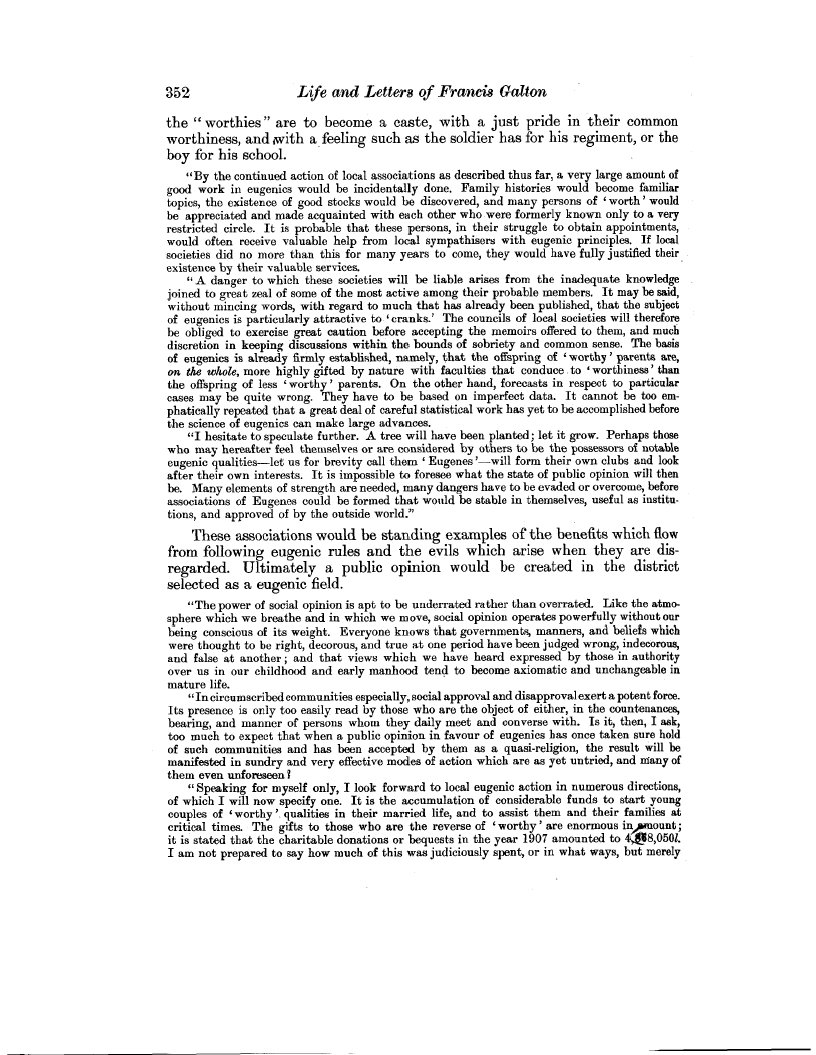| ||||||

OCR Rendition - approximate
352 Life and Letters of Francis Galton the "worthies" are to become a caste, with a just pride in their common worthiness, and with a, feeling such as the soldier has for his regiment, or the boy for his school. "By the continued action of local associations as described thus far, a very large amount of good work in eugenics would be incidentally done. Family histories would become familiar topics, the existence of good stocks would be discovered, and many persons of ` worth' would be appreciated and made acquainted with each other who were formerly known only to a very restricted circle. It is probable that these persons, in their struggle to obtain appointments, would often receive valuable help from local sympathisers with eugenic principles. If local societies did no more than this for many years to come, they would have fully justified their existence by their valuable services. j" A danger to which these societies will be liable arises from the inadequate knowledge oined to great zeal of some of the most active among their probable members. It may be said, without mincing words, with regard to much that has already been published, that the subject of eugenics is particularly attractive to `cranks.' The councils of local societies will therefore be obliged to exercise great caution before accepting the memoirs offered to them, and much discretion in keeping discussions within the bounds of sobriety and common sense. The basis of eugenics is already firmly established, namely, that the offspring of `worthy' parents are, on the whole, more highly gifted by nature with faculties that conduce . to ` worthiness' than the offspring of less `worthy' parents. On the other hand, forecasts in respect to particular cases may be quite wrong. They have to be based on imperfect data. It cannot be too emphatically repeated that a great deal of careful statistical work has yet to be accomplished before the science of eugenics can make large advances. "I hesitate to speculate further. A tree will have been planted; let it grow. Perhaps those who may hereafter feel themselves or are considered by others to be the possessors of notable eugenic qualities-let us for brevity call them `Eugenes'-will form their own clubs and look after their own interests. It is impossible to foresee what the state of public opinion will then be. Many elements of strength are needed, many dangers have to be evaded or overcome, before associations of Eugenes could be formed that would be stable in themselves, useful as institutions, and approved of by the outside world." These associations would be standing examples of the benefits which flow from following eugenic rules and the evils which arise when they are disregarded. Ultimately a public opinion would be created in the district selected as a eugenic field. "The power of social opinion is apt to be underrated rather than overrated. Like the atmosphere which we breathe and in which we move, social opinion operates powerfully without our being conscious of its weight. Everyone knows that governments, manners, and beliefs which were thought to be right, decorous, and true at one period have been judged wrong, indecorous, and false at another ; and that views which we have heard expressed by those in authority over us in our childhood and early manhood tend to become axiomatic and unchangeable in mature life. "In circumscribed communities especially, social approval and disapproval exert a potent force. Its presence is only too easily read by those who are the object of either, in the countenances, bearing, and manner of persons whom they daily meet and converse with. Is it, then, I ask, too much to expect that when a public opinion in favour of eugenics has once taken sure hold of such communities and has been accepted by them as a quasi-religion, the result will be manifested in sundry and very effective modes of action which are as yet untried, and many of them even unforeseen l " Speaking for myself only, I look forward to local eugenic action in numerous directions, of which I will now specify one. It is the accumulation of considerable funds to start young couples of `worthy'. qualities in their married life, and to assist them and their families at critical times. The gifts to those who are the reverse of `worthy' are enormous inlunount; it is stated that the charitable donations or bequests in the year 1907 amounted to 48,0501. I am not prepared to say how much of this was judiciously spent, or in what ways, but merely
|